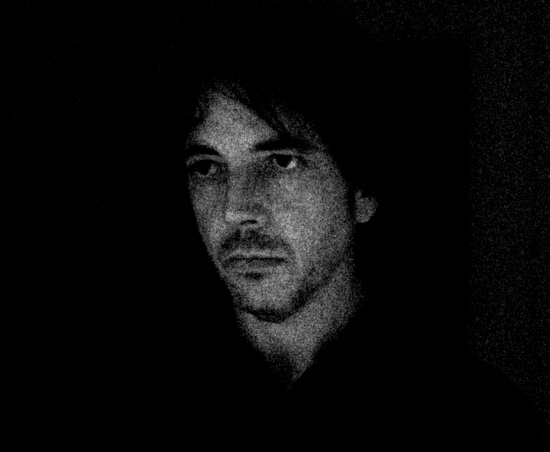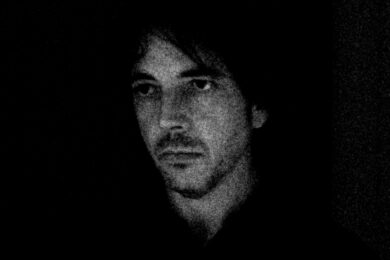Paul T Kirk – AKA Scottish ex-pat Hiroshima Akatombo – creates a brooding, dense sound of alienation and displacement. It is the sound of machines and computers harnessed to describe an existence in a strange land and entirely modern city, influenced as much by Kirk’s work making short films and visual pieces as any recognisable musical style. The Quietus first encountered Akatombo via the minimal white sleeve of his new album Unconfirmed Reports, a record of neo-dubstep that’s never seen suburban streets, industrial grind and soundtrack noise. We dropped Paul T Kirk a line to find out more about his project.
Can you give us a bit of an introduction to the world of Akatombo?
Akatombo is an audio visual project which came about in late 2001. To date, I have released two full-length albums and have had a wide selection of my short films shown at numerous Independent Film Festivals in over 12 countries.
What was the work you did on Colin Newman & Malka Spigel’s label?
The first Akatombo album, Trace Elements, came out on Colin Newman and Malka Spiegel’s SWIM label in late 2003. They were both really kind to me; very helpful and supportive. It received a lot of critical acclaim from some notable quarters including Jon Savage, but saleswise it could have done better. Maybe a bit ahead of its time, musically.
What brought you to Hiroshima?
I left Scotland for Japan over 11 years ago. I’d become very jaded with the music business, (I was running an independent label, managing bands, promoting, etc.), and needed a serious change and a fresh challenge. Luckily, Hiroshima is my wife’s home city, so we decided to give it a try.
How do you find Japan as a place to make music?
It has positives and negatives. On the downside; I’m quite isolated musically; everything ‘big’ happens in either Osaka or Tokyo. Sadly, the Hiroshima scene is a bit too full of punk or skate punk bands trying to be a version of the Ramones – or – they’re into that whole rapper/dj crew type thing. All in all, not very musically challenging, no boundaries being pushed. On the upside; the very fact that I don’t have outside interference or distractions helps me immensely. I’m very much left to my own devices; untainted by any competing musical distractions, if you like. I’m also very fortunate in that I’ve a good friend and very innovative engineer who lives in Yokohama, Makoto Kubota. So, whenever I’ve put together a collection of rough ideas, I can go and work with him in the studio expanding and experimenting.
Does this have any impact on what you do?
I would say definitely so. I can just focus on writing, recording, filming. I seldom watch TV and very rarely listen to ‘outside’ music aside from CDs that friends might send. Thus, I have free rein to experiment without being unduly influenced by any particular music or scene that might be happening elsewhere in the world.
Japan is quite a strange country in which to live; very, very different from the West, so some elements gleaned from it through personal experience do occasionally end up in the music – most often deliberately taken out of context just to keep people on their toes; can’t abide complacency. I’ve no time for the obvious; keep them guessing!
How did the album Unconfirmed Reports come about?
Not long after the release of Trace Elements, I started work on some new tracks with visual accompaniment. (I’d made a short film for the SWIM label anniversary party @ the ICA, and people seemed to like it). Unfortunately however, I took quite ill with meningitis which put everything on hold for a while. Then, just as I was starting to find my feet again I was the victim of a hit and run. So, again, everything was put on hold whilst I recovered. When I did finally begin work in earnest, I found myself, not surprisingly, going for a more abrasive, edgier, darker kind of feel. The process of putting the songs together was much the same as for Trace Elements, i.e., get the basic structures together, see if I needed any extra instruments, find someone who could do it, record their part, and then add more layers of sound on top. Then up to Alchemy Studio in Yokohama to expand and experiment.
A little about the title?
During the time I was recovering after my illness & accident, I listened to the BBC World Service & a few other English language radio stations. At the time there was a lot of conflict happening in various regions of the world and one of the most common phrases I heard was ‘and we have an unconfirmed report of…’. It just stuck in my head & so when it came time to give my new collection of quite disparate songs a title, it seemed the obvious choice.
There’s a lot of apocalyptic-sounding, instrumental music out there at the moment, from doom to Burial and King cannibal. Would you see your work as being in a similar vein?
It’s hard to say really as, apart from the first Burial album which I heard about a year after it came out, I haven’t heard anything that similar to what I’m doing. It’s back to my geographical location again. And I don’t listen to music online; always sounds dreadful, all compressed & tinny. I don’t know if I would say that Akatombo is ‘apocalyptic sounding’; thought-provoking, slightly jagged, rhythmic maybe. As I said before, I don’t have a lot of free time with Akatombo to sit down and seriously listen to what is current and "happening" in any particular music scene. Maybe it’s all down to the mess the world is in at present, what with conflicts raging, recession everywhere, etc. It’s a mirror of the times. Especially if you’re based in a densely populated urban area.
Please name three non-musical influences:
OK, in no particular order;
Jean-Patrick Manchette, a French writer, responsible for two of the best novels I’ve ever had the pleasure to read. Namely; The Prone Gunman and 3 To Kill. Stunningly bleak, existential noir.
Lindsay Anderson, the film-director, for his wonderfully skewed vision of Britain as shown in his Mick Travis trilogy of films starring Malcolm McDowell.
J. G. Ballard for his dystopian urban prescience. Especially relevant considering where I live.
You recently put together an excellent mix for Mary Anne Hobbs. What thinking went into the mix?
Well, aside from being a tad nervous about the whole thing; I’m not a DJ or a mixer! I just tried to blend in various unrelated, disconnected pieces of music that have stayed with me over the years, much like the wild mix of sounds and styles present on both my albums, esp. Unconfirmed Reports. I tried to confuse & delight in equal measure; to show just how wide your musical vistas can be when searching for the right link. You know, everything from obscure cut-up sampling artists like the Tape-Beatles, to late 70s S.F. sci-fi punk outfit Chrome, to early DIY electronic singles.
You describe this as an audio visual project, has that always been the case?
Yes, I’ve always had a fascination with music accompanied by visuals. I think it probably dates back to seeing some of the early Residents short films on the Old Grey Whistle Test back when I was a teenager. Utterly surreal, but also compelling and inspirational. Colin and Malka were very encouraging & supportive too, which gave me a lot of confidence back when I was first starting. I was also very lucky to meet a bona-fide film-maker from the States called Chad McClure when I was in the early planning stages of the work that became Unconfirmed Reports. Doubly fortuitous was the fact that we shared a lot of common interests in terms of film, music, and literature. So I’d go out filming somewhere in the depths of downtown or suchlike and then jot down some rough directions as to what I envisaged would take place visually. Chad then edited where he saw fit, bearing in mind my rough notes. We ended up with over 27 hours of footage. It was quite a task to edit down to a little over 42 minutes.
What’s next for you?
Presently, I’m very busy working on the structures for a number of new Akatombo tracks which will, eventually, become the next album. Now that I’m back to full health, I have been getting much more disciplined with regard to writing, recording and filming. I have also been working on a number of ideas relating to live performances. It would be really good to take the next album out and road-test it, if you like, see what works and what doesn’t. However, this means that I’ll have my head stuck in instruction manuals for a while trying to figure out how to get everything to work properly. All appendages crossed, everything should be up and running by Autumn 2010.



